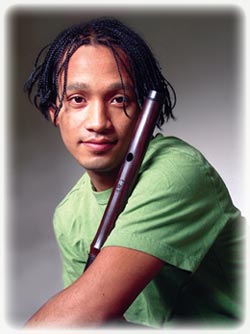|
|
| |
|
Date: Saturday, Jul 22, 2006 |
| |
|
| EVENT
INFO: |
|
 Dear Friends Dear Friends
I've been very lucky in the past few years to have the chance to share the gift of Nepali music with a wide audience and I'd like to thank all of you for supporting me in this endevour! I thought you might enjoy reading this article published in India Currents Magazine out of Northern California.
I will be performing on Saturday, July 22, 2006 From 7:00 PM to 9:00 PM in NY in Central Park on the Summer Stage with Cheb I Sabbah and Riffat Sultana.I think it's going to be a fun evening and i would love to see all my nepali community out in the park..Please feel free to forward this message to your friends.
hope to see you there.
Flute of Many Colors
The myriad sounds of Manose
TEED ROCKWELL, May 15, 2006
The bansuri is structurally one of the simplest of all Hindustani musical instruments, with a single easily recognizable tone. Nevertheless, it can take on a remarkable variety of personalities, depending on who is playing it. Hariprasad Chaurasia's exuberant power, G.S. Sachdev's deep spiritual integrity, Mindia Devi's folkish lyricism, the hint of jazz and African flavorings in Deepak Ram, the even stronger jazz influence in Steve Gorn—all can be expressed by means of this hollow bamboo tube with drilled holes. There is probably no one, however, who has taken the bansuri more places and given it a greater expressive range than Nepali musician Manose.
Manose seems to pop up almost everywhere on the Northern California music scene. He records with Jai Uttal, Rita Sahai, Ancient Future, Digeridoo player Stephen Kent, and drummer John Densmore from the Doors. He performs and jams in venues big and small, wherever there is music that draws him: The Ali Akbar College Concert Series, The Berkeley Dance Jam, The Mendocino Lark Camp (a 10-day music event where he also teaches), and spiritual conferences with Robert Bly and the Institute of Noetic Sciences. This adaptability, however, is not the sort possessed by those anonymous studio musicians who could be replaced by anyone else with a similar level of technical competence. He doesn't disappear into the ensemble when he performs or records. Instead, he finds a place for his unique style and makes it fit perfectly with what everyone else is doing, becoming either supportive or virtuosic as required.
Manose's presence on the Northern California scene is only a small part of his musical influence on the world. He has performed with Nashville bluegrass great Peter Rowan. Since 1995, he has been teaching for the University of Wisconsin's College Year in Nepal and Naropa Institute's Nepal programs, as well as performing in Malaysia, Switzerland, Germany, and France. He even made a recording for a company that sells music at Target department stores, which includes songs like Amazing Grace, Ave Maria, and various Christmas carols. He often says, however, that his favorite recent performance was with the Looking Glass Theater in Chicago, with a chorus of children performing Jai Uttal's music in a production of the Ramayana. "I personally liked it because the whole thing had an awareness of oneness," says Manose, "It involved more than 60 very talented kids from all different ethnicities, and was accessible for both Eastern and Western audience members. I felt proud of being part of it, and representing Nepal with my bansuri. It was so moving that some of us cried while we played and so did people in the audience."
To fully appreciate Manose as an artist, we should start by tracing his roots back to his homeland, Nepal. Some of the first music he learned to love can be found on his album, Notes from Home, which features Nepali folk tunes. These tunes are mostly pentatonic, like the melodies of nearby China and Tibet, and are accompanied by guitar, sarangi, and Nepali percussion instruments, such as the tabla-like folk drum called the modal. What is especially delightful, however, is his ability to artfully enhance these simple tunes with the intricate ornaments of Hindustani classical music. His root guru was shehnai player Madan Dev Bhatta, a disciple of Bismillah Khan. To this day Manose's playing gets part of its power from his unique ability to transfer the fluttering grace notes of the shehnai to his bansuri, and those grace notes give an especially expressive richness to these folk tunes.
Manose's willingness to transplant his Hindustani training did not stop with folk tunes, however. Early on, he formed a fusion group that combined bansuri, guitar, and tabla, which was strongly influenced by John McLaughlin's Shakti. He joined a straight-ahead jazz combo that played standards like "Girl from Ipanema" on bansuri, sarangi, tabla, and guitar. (Surprisingly, it worked quite well.) And most importantly, he joined a rock-and-roll group called 1974AD, which made him a Nepali rock star.
"When I was younger, my friends thought I was crazy to be interested in Hindustani classical music," said Manose, "because they all liked rock music. Now that I'm playing in a rock band, all the kids think that the bansuri is cool, and lots of young people want to study with me. Bansuri players in Nepal always thank me for making the instrument so popular."
Manose, however, has little attachment to fame, perhaps because his travels have taught him how context-dependent fame always is. Most of the people who attend his intimate performances in California would be surprised to learn that 1974AD's largest concert in Kathmandu had an audience of 30,000, with almost as many outside being held back by riot police. When 1974AD performs in Darjeeling or Sikkim, their audiences are around three to five thousand. But when Manose does a performance of classical music in the same cities, his audiences are about 300. Last New Year's Eve, he performed for an audience of less than a dozen people—but it was in a palace for the Nepali royal family. Receiving royal favor does not stop him from speaking his mind, however. "Pinjada ko suga," the title song of 1974AD's newest album, was banned from Nepali radio as politically subversive. The lyric was written by 19th-century Nepali poet Lekhnath Paudyal, and compares the Nepali people to a bird in a cage imprisoned by tyrants.
Although Manose remains busy performing in California and elsewhere, he still finds time and resources to give back to his homeland. Every year he does a free full-moon concert in Kathmandu, in which he plays Hindustani classical music along with other prominent performers. He donated money to buy a sound system for that concert series, and also created a prize for young players of classical wind instruments in honor of his recently deceased guru.
Manose's recordings are available at www.manosemusic.com
Teed Rockwell has studied Indian classical music with Ali Akbar Khan and other great Indian musicians. He is the first person to play Hindustani music on the Touchstyle Fretboard
--
Manose
www.manosemusic.com
|
| |
|
|
Venue:
Central Park, NYC
|
|
Viewed
2882 times |
|
|
|



